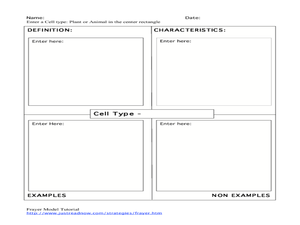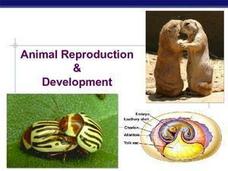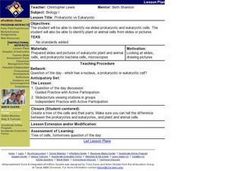Curated OER
What is an animal?
In this animal instructional activity, students determine five characteristics that all animals have in common. Using these characteristics, students fill in a table demonstrating what living things have those characteristics.
Curated OER
Cell Type
In this cells worksheet, students complete a graphic organizer where they fill in boxes for the cell type they are researching. Students complete boxes for characteristics, examples, non examples, and a definition.
Curated OER
What is an Animal?
In this animal worksheet, students review characteristics of animals including body symmetry, development, and skeletal structure. This worksheet has 3 short answer questions.
Curated OER
Energy in a Cell
In this energy worksheet, students search for nineteen words related to energy producing and energy capturing reactions in plants and animal cells.
Curated OER
The Cell Cycle
In this biology learning exercise, students label 9 diagrams with the correct names. They also write short answers to 6 questions that follow.
Curated OER
7th Science Quiz
This seventh grade life science quiz has a professional appearance and well-written multiple-choice questions. However, it seems to cover too broad a variety of biology topics for only 15 questions to fully assess. There is one question...
Biology Corner
Cell Theory Rap
All that this will link you to is a rap about cell theory and organelles. Use it as an example for a creative assignment in your biology class. Divide the class into groups and assign them a topic for which they write and perform a skit,...
Curated OER
The World of Living Things
The World of Living Things is the focus of this biology presentation. Students view a presentation which introduces them to cells, parts of cells, microorganisms, and simple vs. complex animals. They see that they are classified as a...
Curated OER
Animal Reproduction and Development
Details of fertilization, cleavage, the placenta and fetal development are presented, along with important diagrams and illustrations. By using these slides, you and your students will generate discussion points, along with details...
DePaul University
The Working Tools of Insects
The animal kingdom is full of interesting organisms that have unique ways of surviving. Children read about different insects that have special tools for building homes and protecting themselves. When finished, learners identify the main...
Curated OER
Immune, Lymphatic System
A fantastic slideshow that has images, details, definitions and trivia to accompany each structure and response involved with the immune system. The slides are very useful for all levels of the immune response. A complete sets of notes...
Curated OER
Biology: Make a Model Cell
Students compare and contrast plant and animal cells and then create a model of the latter. They visit Websites to view the cells and answer questions about them. In pairs, students create cell models using plastic baggies, syrup,...
Curated OER
In Cell-A-Bration of Cells
Sixth graders identify major cell organelles found in both animal and plant cells. Pupils observe a PowerPoint presentation based upon the features of a haiku. They create haiku science-based poem which describe the characteristics of...
Curated OER
Cells
Students are introduced to the life cycle of a cell. In groups, they identify and describe the function of organelles. They compare and contrast the differences and similarities between plant and animal cells as well. They complete a...
Curated OER
The Great Archeological Dig
Learners explore biology by identifying a diagram. For this cell anatomy lesson, students read a story about archeology and conduct a fictitious archeology dig in class in which they search for animal cells. Learners define a list of...
Curated OER
Prokaryotic vs Eukaryotic
Students identify via slides prokaryotic and eukaryotic cells. They identify plant or animal cells from slides or pictures. Students are given the question of the day. They are asked which has a nucleus, a prokaryotic or eukaryotic...
Curated OER
The Living Environment
Sixth graders show what they know about plant and animal cells. In this cell project lesson, 6th graders get to choose a project based on their learning style. They can create a visual representation of cells, auditory forms, or build a...
Curated OER
How do plant & animal cells make and use energy?
Middle schoolers show the relationship between the need for plants to undergo photosynthesis in order to generate oxygen. They see the flaws associated with this thinking because of the lack of CO2 and H2O and lack of sufficient gravity...
Curated OER
Typical Animal Characteristics
How is an animal formed? Scientists use a diagram to examine early post-fertilization stages, and the creation of the blastula. They look at a second diagram to observe the transition from the blastula to a gastrula. Three comprehension...
Curated OER
Inside of a Cell
In this cell worksheet, students complete a graphic organizer by determining what organelles are found in plant or animal cells and their functions.
Curated OER
Seeing Cells
Sixth graders study living cells and their functioning units. In this cell lesson students color cell diagrams, answer questions and discuss the differences between plant and animal cells.
Curated OER
Cells
In this biology worksheet, students use the clues given at the bottom of the sheet to complete the crossword puzzle on cells. There are 22 clues to solve in the puzzle on cells.
Curated OER
Cell Cookies
Fifth graders, in groups, create a plant or animal cell out of cookies, frosting, and candy pieces.
Other popular searches
- Plant and Animal Cells
- 3d Animal Cell
- Animal Cell Structure
- Animal Cell Organelles
- Plant vs. Animal Cells
- Animal Cell Parts
- Animal Cell Label
- Animal Cell Diagram Blank
- Animal Cell Diagram
- Animal Cell Model
- Building an Animal Cells
- The Animal Cell

























